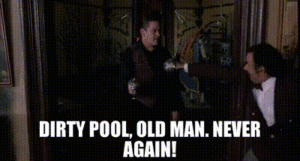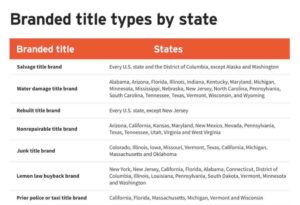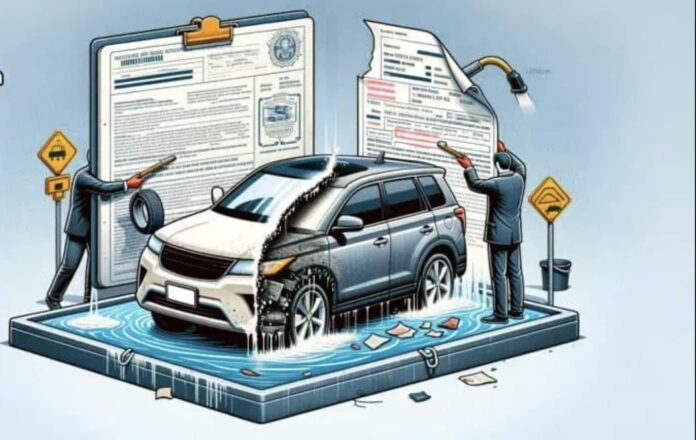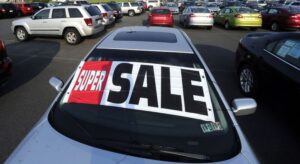My friend Bill Meyer, who is the host of The Bill Meyer Show (KMED FM in Medford, OR) told me a story the other day about one of his show’s listeners who’d called in to tell him a tale of woe about a car she’d recently bought. What she wasn’t told was that the car had previously been in a pretty severe accident – and repaired to appear as thought it hadn’t been.
She doesn’t know whether the dealer that sold her the car knew about this – and it’s possible the dealer didn’t. It is possible the title was washed, which is kind of like money-laundering except the money, itself, is only rhetorically “dirty” (as in it being the kind acquired illegally) while title washing is dirty – as in pool – in that it is done to hide the fact that the vehicle isn’t worth what you just paid for it.
The repairs may be top-notch and the car as good as new. Or at least as good as it was before it got smashed up. But the car’s value may be crashed on account of the damage done – even if repaired properly – because most people understandably shy away from buying a vehicle that was badly damaged (including flood damaged) because you never know whether something wasn’t fixed and why take the chance when you could just buy another car of the same make and model that wasn’t badly damaged? The resale value of such a vehicle will also be less – which means you pay for that.
And that’s why titles are washed.
And that’s why it’s dirty pool.
You think you’re getting something that isn’t what they’re selling – and (again) the seller may not know anything about it, either. Dealers regularly buy used vehicles at auctions and these come from all over the country and may have been through god-only-knows-what. In some cases, a vehicle that was smashed up in one state (or under water in another) will be flat-bedded to another state and repaired – and re-titled – in that state, with all appearing good as new.
Car and paperwork, too.
The paperwork is especially important – if the person/dealer/whomever who is spending the money to repair the damaged vehicle wants to get what they spent back by selling the car at full market value. Honest disclosure can cost a lot of that. In some states, a “salvage” or “reconstructed” (R) title means that even if the vehicle is perfectly safe to drive it may be impossible to insure – as some insurance companies won’t, as a matter of policy, cover a car that has such a title. If you buy such a car without noticing the “R” on the title – or understanding what it means – you may find out the hard way exactly what that means when you call up your insurance mafiosi to ask about a quote.
You may not get one.
And if you can’t find one, you’ve got a vehicle you won’t be able to legally operate on public (that is, government owned) roads because the government says it’s illegal to drive an uninsured vehicle on its roads, never mind its roadworthiness or the fact that you tried to buy “coverage.”
Loss of value – and potential loss of use – are two excellent reasons to be sure the vehicle you’re thinking about buying hasn’t got a white-washed title.
Before you actually buy it.
A CarFax title search alone isn’t sufficient – and neither are the dealer/seller’s assurances, even if genuine. We live in shady times and the ancient dictum that the buyer best beware applies today more than it ever did.
Run a CarFax, by all means. And absolutely read the vehicle’s existing title very carefully. Look for the telltale “R” – and the more obvious “salvage” – and walk away if you see either.
But your best assurance is to literally have a look-see.
Even better, have someone else who knows what to look for take a look – with the vehicle on a lift. A person who knows what to look for will usually be able to see evidence of repairs done because there will be a visual disparity between new bits and pieces and the older bits and pieces that came with the vehicle when it was assembled. New welds (and new metal) as well as new overspray (as of paint) being among the most obvious tells.
You may also not be able to see anything at all – because everything underneath the vehicle has recently been sprayed over with undercoating or black paint. That is another tell – and reason for extreme suspicion.
As with so many things in life, everything ought to add up – and if something doesn’t, then it’s not unlikely that something’s not right. In which case, better to err on the side of caution than to end up holding the bag for someone else’s mistake.
. . .
If you like what you’ve found here please consider supporting EPautos.
We depend on you to keep the wheels turning!
Our donate button is here.
If you prefer not to use PayPal, our mailing address is:
EPautos
721 Hummingbird Lane SE
Copper Hill, VA 24079
PS: Get an EPautos magnet or sticker or coaster in return for a $20 or more one-time donation or a $10 or more monthly recurring donation. (Please be sure to tell us you want a magnet or sticker or coaster – and also, provide an address, so we know where to mail the thing!)
If you like items like the Baaaaaa! baseball cap pictured below, you can find that and more at the EPautos store!













Doesn’t help that car “titles” are confusing and complex for no reason. But that is because its a government run thing so its not a surprise.
I bought a 2014 Ford Transit Connect in 2015, 14K miles, “branded title” full disclosure of repairs for $14K from a dealer in CO that specializes in salvage repairs. USAA insured it, Ford honored the warranty, and it’s still reliable and shiny 10 years and 120K miles later. The airbag dummy light is always on, other than that, it’s been a reliable daily driver. I was aware of the potential issues before I drove it home, and have done all scheduled maintenance since. The dealer had a salvaged Maserati in their showroom at the time. I would not have taken the same risk with the Maserati…just set limits and know what you’re getting into before buying…take your time and do real research…trust but verify/buyer beware…as with any vehicle…
Another problem…vin swapping….
Someone has a salvage title car…un insurable until rebuilt…
finds another identical car that is rusted out…..but clean title….almost no value….buys it…swaps the vin onto the salvage title vehicle….
Crashed cars at Copart….
Copart used to have mostly crashed, damaged vehicles….now they have repos…non crashed stuff….get a cheap used car…no dealer licence required…
https://www.youtube.com/watch?v=DFikkgiiw8A
I saw a Firebird on a used car lot about 20 years ago…..it had about a dozen declarations of accidents….we joked that it actually got better……a lot of the parts on the car had been replaced…lol….
I bought a new battery for my Pathfinder, do I have to change the title too? Does the work need to be reported?
I had an old battery from another vehicle for a core exchange, do I have to report the change in the status of the old vehicle no longer in service?
Do the Israelis apply for a visa before entering the Gaza strip with tanks, or do they just blow everything to smithereens first?
You would think the Israelis would ask for permission first before dispensing 50,000 Palestinians from their mortal coils.
There are laws against genocide, or there should be. Goes from irrational to the absurd, like ludicrous speed to plaid or something.
Stop quoting your laws, we have swords – General Pompey
The road to Armageddon is paved with dead bodies.
I did not know this was a thing. Thanks Eric!
After reading it this morning, I immediately called my brother who recently bought a ’22 Toyota Tacoma. He looked at the window sticker and the title. All is well. We were both nervous for a few minutes.
It’s also going to be our wallets that get washed, now via the (((FEDGOV))) EPA to manufacturers…all just for making vehicles that get a little more of the “good gas” into the air, CO2….
https://www.autoblog.com/2024/07/03/gm-will-pay-146-million-fine-because-5-9-million-older-vehicles-emit-excess-carbon-dioxide/
That’ll be us, the customer, eventually paying that fine, in the next vehicle or parts we buy from GM…if ever again…and even if you hate GM, just losing another manufacturer, jobs, and vehicle choices, etc, is long term bad for all of us.
YMMV…
There was a shop near Huntsville years ago that specialized in rebuilds. He did the rebuilds and sold the cars on his own lot. He advertized the cars as such. Great shop with all the equipment to do the work properly. We bought an ’86 Taurus in about ’88 which was front from one car, rear from another. Fairly easy to do with a FWD if you have the right skills and equipment. Each vehicle he sold had an “Alabama State Police” VIN affixed to the door frame on the driver’s side and a salvage title. No attempt to hide its source. It turned out to be one of the best values in cars among the 35 that I have owned. Ran and ran, always looked great. We passed it on to one of our daughters who eventually “traded it in” when the transmission finally gave up the ghost at over 200,000 miles. (Dealer knew its condition. And the swap was made just in the nick of time since she pulled it into a parking place and it refused to back out of it.) It probably got bailed that time even though it still lookeed really good. Can be done, and can be advantageous if you know the facts before hand.
The gizmos to measure paint thickness on body panels are widely available online.
A factory finish untouched by a body shop should have a uniform paint thickness even on a Kia or Hyundai.
….The gizmos to measure paint thickness on body panels are widely available online…..
The cheaper old school way to test paint thickness…
Get a ballpoint pen…..hold the pen 6 inches above the paint…ballpoint down…drop it…
If the ballpoint leaves a dent in the paint is too thin….maybe only one coat….
You definitely need to be on the lookout for flooded vehicles, but this is so hard to do. Best to stick with cars from your own state and nothing that was purchased at out of state auction. No telling where they came from or why.
I have heard several stories of these flood vehicles, without comprehensive or collision, so they never get totaled by insurance, get sold off and cleaned up. Must be bad because they even run news stories around here on occasion. New owners can look forward to upcoming electrical and corrosion problems.
This is where car history reports can provide a false sense of security.
Look under for rust under the dash, carpet, trunk, seat frames . A lot of those parts aren’t plated or painted and only rust if flooded.
A flooded car can be fixed but unless you love the car the cost to do it properly will shock you. Hemmings had an article years ago on what one owner went through to save his beloved car.
“This is where car history reports can provide a false sense of security.”
It is close to impossible to know 100%…that the car hasn’t been hit, damaged, etc…..those reports are not 100%….
If you buy a used car from a dealer and there is issues….. you can go back and complain….they might fix the problem….
If you buy privately….you have a real problem if there is issues…you will have to sue the seller….
and….when you buy privately people usually pay more then at a dealer…lol….
since information being available on the internet, it got easier to try and figure out used car values….
During convid used car prices went crazy…now they are dropping….this makes putting a value on a used car today tricky……
HOW TO RESTORE A FLOODED CAR
https://www.youtube.com/watch?v=SMSQKhOGJCk
While I’m not bothered by salvage titles and knew a guy who’s shop did the alignment, welding and paint work on salvage vehicles but I don’t know if any further inspections were done after he completed his share of the work. I also know a guy who only buys salvage vehicles for his business. He tells me that by the time he’s done with them the difference in value between them and a non salvage titled vehicle is negligible.
But I didn’t consider the insurance aspect and I suspect if the title status whether washed or salvaged is not disclosed might open the seller up to fraud charges.
Another thing to consider is that an insurance company will write off an older car for damage that they would not do to a newer car. I’ve got a friend who’s car was pushed sideways down a highway by a semi and because the repair was cheaper than the payout repaired it. She says the car looked and drove as good as before and she was happy with the work. This car of course will never have a salvage title but there is a record of major repairs.
I’ve gone to plenty of car shows where the proud owner has pictures of his car all cut up while they were replacing all the rusty sheet metal. From what I’ve been told most shops would rather repair newer cars as they are not rusted out. This of course means the KIA gets a salvage title and the Packard gets a best of show trophy even though it was in much worse condition to begin with.
> by the time he’s done with them the difference in value between them and a non salvage titled vehicle is negligible.
Hi, Landru,
I guess what actually happens before he is “done with them” is crucial.
All sorts of machinery, from steam locomotives
https://www.up.com/heritage/steam/index.htm
to aircraft
https://planesoffame.org/aircraft
can, and has been, restored to safe and reliable operating condition by knowledgeable people.
But, there is always a risk, even with the most meticulous restorations.
Sadly, the Planes of Fame N9MB Flying Wing eventually crashed, killing he pilot, after having flown successfully for many years. I do not know the cause of the crash.
>did the alignment, welding and paint work on salvage vehicles but I don’t know if any further inspections were done
Sounds to me like you and your buddy are knowledgeable enough to realize what must be done. As we know, “new welds,” per se, are not the problem. Welds which did not use a proper welding procedure for the material involved, and/or which were not properly inspected after they were done, most definitely are. Joe Schmo who is washing titles likely hasn’t got the knowledge, let alone the inclination, to do it right.
But, welds are not the only issue, and some issues exist regardless of whether the vehicle has been restored from salvage. Fast moving parts, such as gears and shafts, which have been overheated can become brittle, which will not be obvious to a visual inspection. I found this out the hard way, once. 🙂
The insurance issue appears to be a real bitch. If you spent tens of thousands meticulously restoring an old classic, only to have your insurance company tell you that to them, the value is less than $1000, it is definitely time to start shopping for a new insurance company. And remember to bring more wallet, because it is likely going to be expensive.
Hi Adi. The buddy whose business bought salvaged is a sheet metal contractor and drives them for 5 years or so and they got regular maintenance. He generally gets trucks under 3 years old with front end damage.
Insurance companies can find a salvage title on there computers, a rusty Superbird that came out of a barn in Louisiana and got rebuilt not so easy. The collector car insurance companies want pictures but after 25 years of age they know that rust repair was done. Another shop owner I know would buy Corvettes with rusted out bird cages (sheet metal under the fiber glass body) just to get parts including the frame. He would cut out the factory welds and then use sections to restore more valuable car. All MIG welded; the only “problem” was his welds were better and nicer looking than the ones GM did. Welds on GM frames from the 1960’s can look really ugly; first day on the job maybe or didn’t care?
Hi, Landru,
>after 25 years of age they know that rust repair was done.
Depends where the car lived when running and/or stored.
There is a world of difference between a desert car from a place with 5″ annual rainfall and any place with high precipitation and/or exposure to salt air or road salt. My brother’s ’32 Chevy hot rod (big block Chevy!) lived in the desert and had only surface rust when he bought the hulk.
>Welds on GM frames from the 1960’s can look really ugly
Instructor for the basic arc welding class I took, many years ago, had worked on an automotive assembly line at one time. Nowadays, body welds are mostly, if not entirely, done by robots, but back then it was stick welded by humans, and the name of the game was production. Appearance was of no concern, as long as the weld held, so welders taught themselves “shortcuts” to get the job done.
Mr. Earnest, the instructor, was a real artist with a welding torch, so the auto assembly line gig was really beneath him. The pipe flange he welded up as a demo for his students was a thing of beauty. Every petal of the weld was perfectly formed, and almost exactly the same as its neighbors.
I have great respect and admiration for those talented craftsmen who can weld pipe to 100% radiographic inspection standards. They really are “pipe surgeons,” IMO. Some people have a natural talent (I’ve met a few), and can make it look easy, which it definitely is not.
As we both know, weld filler typically is stronger than the base metal. E60xx rod is 60 ksi steel, so if you use it to weld structural A36, for example, the welded part *is* stronger than the original, provided the weld is properly designed and properly constructed.
Many years ago, I was involved with the construction of a church which used W40x593 WF beams for the main balcony girders. For those who do not know, 40 is the nominal depth in inches, and 593 is the weight per lineal foot, in pounds. Flange thickness for W40x593 is 3.25″
Although this is an AISC section, no U.S. mill rolls them. They are only rolled by Arcelor Mittal in Belgium, and had to be imported for this project. Challenge was that the maximum shipping weight is limited by the material handling equipment at the ports, which meant that each balcony girder (2 total) had to be shipped as two pieces, and welded into one at the L.A. City certified steel fabrication shop, Blazing Industrial Steel, in Riverside, CA.
Here is one of the girders:
https://www.tktn.com/projects/sunrise/062703-6.jpg
“open the seller up to fraud charges.”
Selling a car as having a clear title…but ….there was a previous $15,000 damage repair….not declared…
There have been sales reversed over this…if sold by a dealer…if sold privately…it is harder to get it resolved…maybe sue the seller?….
Eric,
I recently saw a suspect car. I’ve been looking for a low mileage, 3rd Gen Nissan Altima (2002-2006 model years). I saw one on Autotrader, so I looked at it. The first tell showed up in one of the pics: the the brake pedal cover was worn, making the metal of the pedal itself visible. The claimed mileage was just under 68K; however, for a pedal cover to be worn through like that, the mileage has to be WELL NORTH of 100K!
I still wanted to look at the car though, so I looked at the Carfax report. Early in its life, it was well looked after. After that, there was a gap, though that might or might not be significant; after all, not all shops report to Carfax. It was, however, bought at auction. I went to look at the car, which was 1.5 hours from me. I figured that, if nothing else, I’d get out of the house for a few hours and give my Focus some exercise; it hadn’t had a good highway run in a while.
There were other obvious tells that this car was best avoided. One was that the cabin REEKED of cigarette smoke! The second was the aforementioned brake pedal. Another obvious tell was the hood’s prop rod wasn’t properly mounted; it was in its clip, but it wasn’t hinged on the other end. The fourth obvious tell was that the trunk release didn’t work. As a former Altima owner, I knew where this was, so I checked it; I pulled up the lever next to the driver’s seat, and nothing happened. Carfax reported minor rear end damage that had been repaired, but the paint on the rear deck area matched the rest of the car. Finally, the symbols on the key fob were TOTALLY worn off! I couldn’t remember what button did what, so this would’ve been handy. I’d had my Altima for 120K miles; though I’d had to get new fobs (the old fobs and keys didn’t work), the symbols barely wore off. After giving the car a lookover, I walked back to the dealer office, handed them the keys, and I walked away.
Another factor is, is the car stolen?
A friend bought 2 Porsche 912’s from a barnfind (several dozen cars) sale that was located in SE VA. The NC DMV has a theft division that ran the vin’s and found both had been stolen in 1970 about 2 miles apart in the NYC metro area.
I find it hard to believe that only those two cars were stolen.
He had a heck of a time getting the paperwork straightened out (I’m not sure he ever did) and the cars sit, unrestored.
In some states, a “salvage” or “reconstructed” (R) title means that even if the vehicle is perfectly safe to drive it may be impossible to insure …..
In some cases a vehicle can go through a mechanical and structural inspection….then all required repairs must be done….then it might be insurable again….at huge cost…
unless it is collectible and you bought it for almost nothing….the cost of all this work might be more then the new resale value….not worth the effort….
most salvage title cars get parted out….or crushed….
For EV’s ….even a very small accident causes them to be scrapped….too expensive to fix….too dangerous…the battery is very fragile…..they are far too dangerous…even before they are hit….
For EV’s ….even a very small accident causes them to be scrapped…causing very high insurance rates, or un insurable…..no insurance…. no driving…the real goal….agenda 2030…
No more slaves driving around….the slave owners warned the slaves…..
You vill eat zee bugz
You vill rent everysing
You vill own nusing
Your body vill be a 6G transgender transceiver
You vill live in a high rise prison with zee 200 sq ft coffin apt
And YOU VILL LIKE IT!!!
No more slaves standing in the way of watching Old Faithful at Yellowstone or creating long lines at the gift shop.
I heard Glenn Beck go on about enduring that at length for about an hour in the recent past.